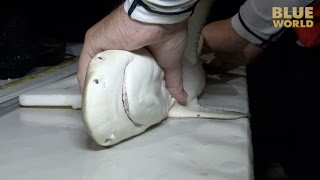Of course they don't see every fish.
当然,他们无法看到每一种鱼。
This lionfish hiding in a hole escaped detection.
藏在洞里的狮子鱼没被发现。
But this technique yields a pretty good estimate of fish numbers on this section of reef.
但这项技术能很好地估计出这片礁石上鱼的数量。
By comparing the transect results inside and outside of the marine protected areas, the students can learn not only how well the marine protected areas are working but on which species.
通过比较海洋保护区内外的样带结果,学生不仅可以了解海洋保护区的工作情况,还可以了解有哪些物种。
Of course, fishing pressure is what affects fish populations, so it makes sense to also try to get a handle on what species of fish are being caught.
当然,捕捞压力是影响鱼类数量的因素。因此,也应该设法掌握捕捞的鱼类种类。
The students work with the local fishermen who volunteer to allow the students to come down to the docks at the end of the day and see what kind of fish they are catching and how big they are.
学生们和当地的渔民一起工作,渔民们自愿让学生们在一天结束时来到码头,看看他们钓到鱼的种类,以及它们的个头。
The fishermen know that research like this and marine protected areas will help to insure that there are always enough fish to catch.
渔民们知道,像这样的研究和海洋保护区将有助于确保总能有足够的鱼可供捕捞。
Another team of students, another research project.
另一组学生,进行另一个研究项目。
This team is working in snorkel depths without scuba--studying a big snail called a conch.
这个小组在不带水肺的浮潜深度工作,他们在研究一种叫做海螺的大蜗牛。
The conch is one of the most popular seafoods in the Caribbean, and a whopping 10% of the world's supply comes from the tiny island of South Caicos, so it's an important resource.
海螺是加勒比海最受欢迎的海产品之一,世界上高达10%的海产品来自南凯科斯小岛,因此它是一种重要的资源。
The conch population seems to be dropping, so the conch research team urgently needs data.
海螺的数量似乎正在下降,所以海螺研究小组急需数据。
This transect in the seagrass bed is being used to count conch.
海草床上的这个样带正被用来计算海螺数量。
But their work doesn't end there.
但他们的工作并未就此结束。
They also collect a few conch for additional research on land.
他们还收集了一些海螺,用于在陆地上做进一步的研究。
Back at the shore, alongside a representative from the Turks & Caicos Department of Environment and Maritime Affairs, the students crack the conch open in the traditional way.
回到岸边,学生们协同特克斯和凯科斯群岛的环境和海洋事务部的一名代表,采用传统的方式打开海螺。
Student Daniel Liu is trying to come up with a way to determine the size of the shell…when the shell is gone.
学生丹尼尔·刘正在尝试用一种方法,在没有贝壳的情况下,来确定贝壳的大小。
Fishermen often take the meat out of the shell at sea and return with only the meat and no shell.
渔民在海上经常把肉从壳里拿出来,只带肉而不带壳返航。

How can the government recommend or enforce size regulations if there is no shell to measure?
如果没有空壳可以衡量,政府如何推荐或实施规模监管?
So Daniel's research is looking at other ways to gauge the maturity of a conch, without a shell.
所以,丹尼尔的研究正在寻找其他方法对没有贝壳的海螺成熟度进行评估。
As the sun sets and the air cools down, my day following the students isn't over.
太阳下山了,空气变凉,我跟随学生的这一天并未结束。
I have re-joined with the shark team to follow along on their night work.
我重新加入到鲨鱼小组,继续参与他们的夜间工作。
Baby sharks live in the mangroves, where they are safe from a lot of larger predators.
幼鲨生活在红树林中,它们在那里很安全,不会受到很多大型捕食者的攻击。
A couple of nights a week, Dr. Henderson and his students head over to the mangrove areas to catch baby sharks.
一周中有几个晚上,亨德森博士和他的学生们会到红树林地区捕捉小鲨鱼。
They start by setting a net in the chest-deep water, hoping to snare small sharks as they cruise by.
它们首先在深度没胸的海水中设置一张网,希望在小鲨鱼游过时能诱捕到它们。
Every 15 minutes they check the net, and when they have a shark, they bring it back to a makeshift lab on shore where they will weigh it, tag it with a electronic tag, take a small tissue sample, some ID photos, and then quickly get it back into the water.
每隔15分钟他们会检查一次鱼网,捕获到鲨鱼时,他们会把鲨鱼带回岸上的临时实验室中,在那里进行称重,用电子标签给鲨鱼标记,取一小块组织样本,拍些照片,然后迅速把它放回水中。
One of the students will swim the baby shark around for a few minutes to re-oxygenate its gills, and then they send it on its way.
其中会有一名学生在小鲨鱼周围游几分钟,给它的鳃重新充氧,然后护送它上路。
From sharks, to fish to conch and more sharks, my day with the marine biology students at the School for Field Studies in South Caicos was exhausting but exciting.
从鲨鱼,到鱼,再到海螺,还有更多的鲨鱼,我和南凯科斯群岛海洋生物学院的学生们在一起的一天,令人感到筋疲力尽,但又让我兴奋不已。
I saw how marine biology can be conducted from shore, from a boat, and underwater using scuba or snorkeling.
我看到了如何在岸上、船上和水下使用水肺或浮潜等方法,进行海洋生物研究。
Sometimes we imagine marine biologists as having glamorous jobs working with marine mammals, or exciting jobs diving with sharks.
有时,我们把海洋生物学家想象成与海洋哺乳动物在一起的令人着迷的工作,或是与鲨鱼一起潜水的令人兴奋的工作。
But marine biology is a broad spectrum of ocean-related studies with specialists in everything from plankton growth to whale rescues, and everything in between.
但是,海洋生物学是一个与海洋相关的广泛研究领域,从浮游生物的生长到拯救鲸鱼,以及介于两者之间的一切知识。
Sometimes it is pretty exciting.
有时,真的很刺激。
Sometimes, it's not very glamorous.
有时,它又不是很迷人。
But if you love the ocean and the life in the ocean, marine biology is a job that will never be boring!
但如果你热爱海洋和海洋中的生命,海洋生物学是一份永远不会让人感到无聊的工作!












